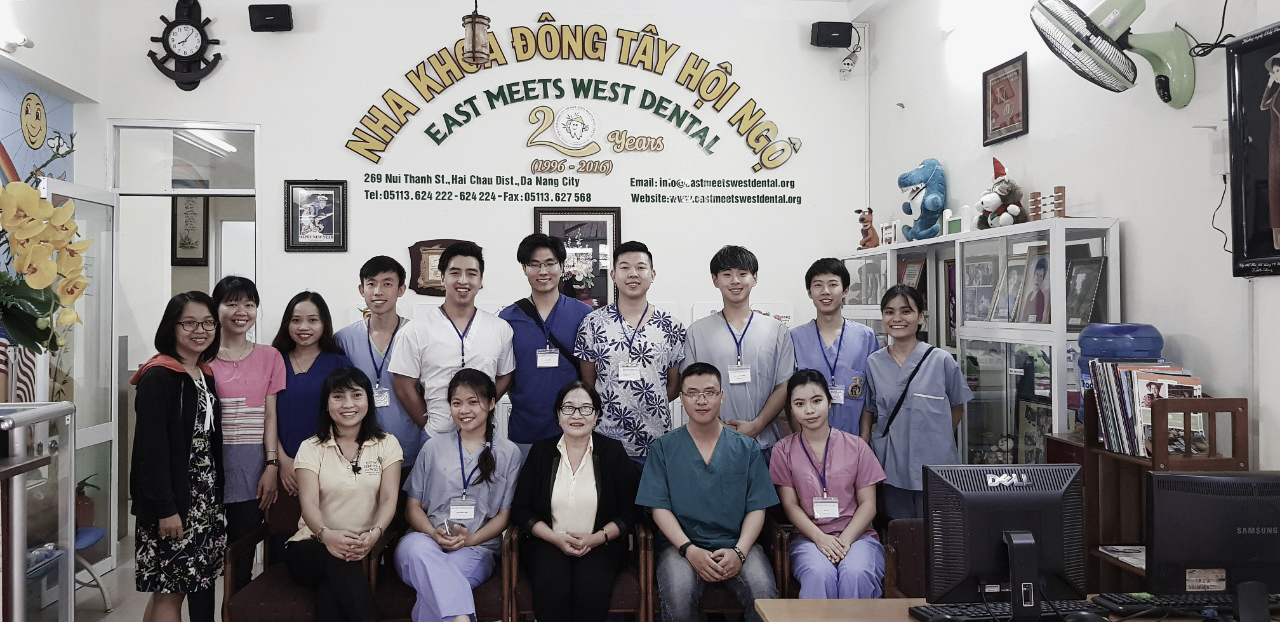Future Focus: Richard Huynh
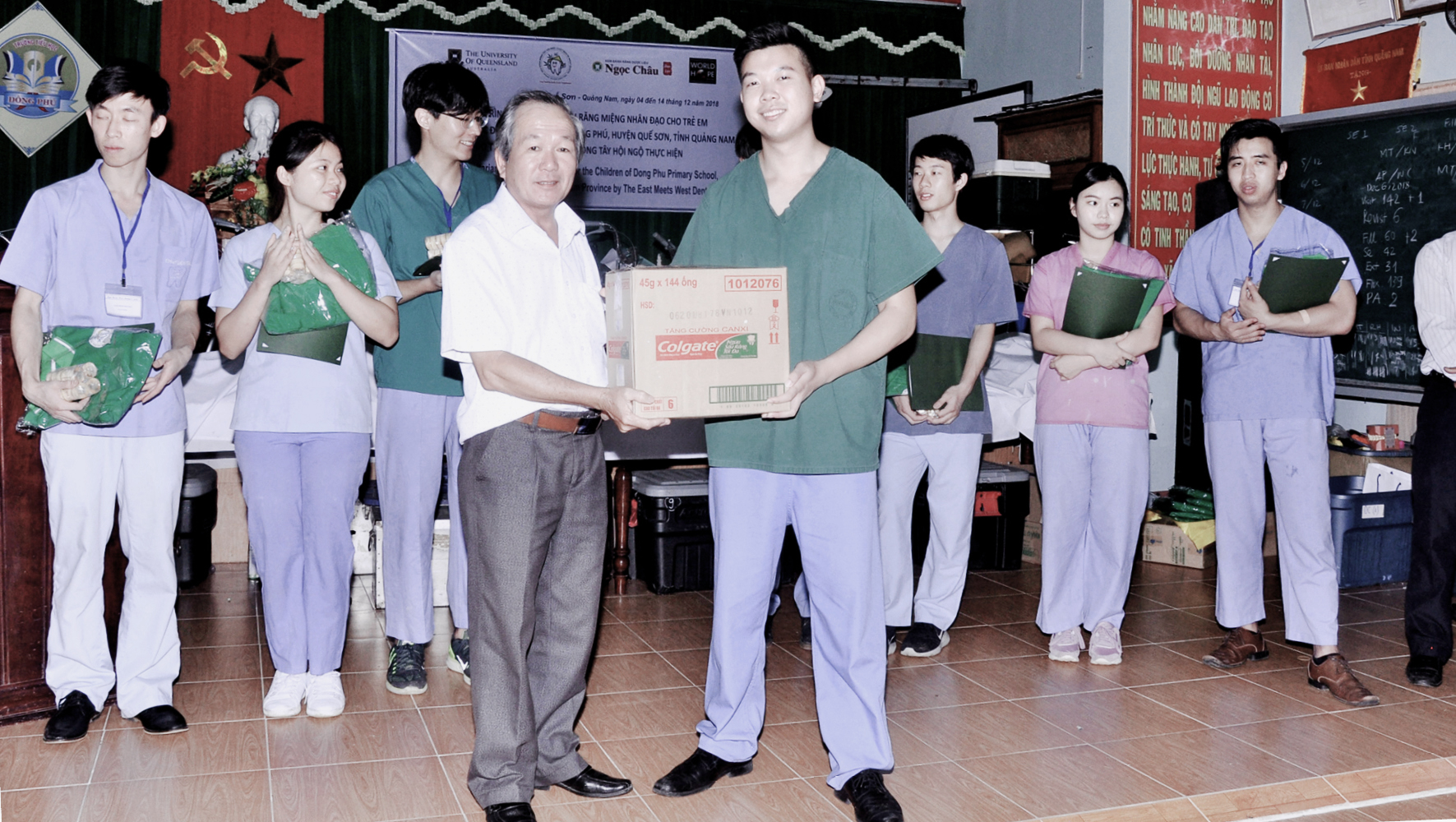
Richard Huynh, a dental student from the University of Queensland, was one of the five recipients of our FutureFocus grant in 2018.
Richard completed his two week placement in Vietnam where he joined the staff at East Meets West, assisting in their humanitarian outreach program to improve the oral health of teachers and students at Dong PhuPrimary School. During his placement, Richard gained first hand experience, as he and the team transformed the school hall into a functional dental outreach centre, treating 794 patients during his two week placement.
Read a full account from Richard about his incredible journey below.
In December 2018, I had the opportunity to do something remarkable in Vietnam...
Having been astounded by statistics estimating that more than 85% of children had tooth decay and anecdotal evidence of inaccessibility to dental care, I embarked on a journey to witness the oral health disparity between a developed and developing country. Along the way, I hoped to learn new techniques of delivering treatment with limited resources and connect with other international oral health professionals with similar philanthropic mindsets.
My trip was so rewarding and exceeded all of my expectations. Those two short weeks abroad were an intellectual rollercoaster as I swapped between the different roles of being a student, clinician, counsellor, infection control consultant and public health policy writer.
Alongside seven other colleagues, I travelled to Da Nang, Vietnam, where the East Meets West (EMW) Dental Centre is based. EMW facilitated our humanitarian outreach program and offered insight into how they are able to support regular pro bono projects. There are two sides to the EMW business model: one humanitarian and one commercial. The commercial arm provides dental services for predominantly foreign patients with its proceeds funding the humanitarian arm. This model vastly differs from many Australian philanthropic models that fund their charitable causes through donations and the sale of self-branded products during awareness days. EMW’s model depends less on appealing to the local population, who often cannot afford to donate, and instead re-allocates the comparatively greater wealth of foreign patients to impoverished local sub-populations.
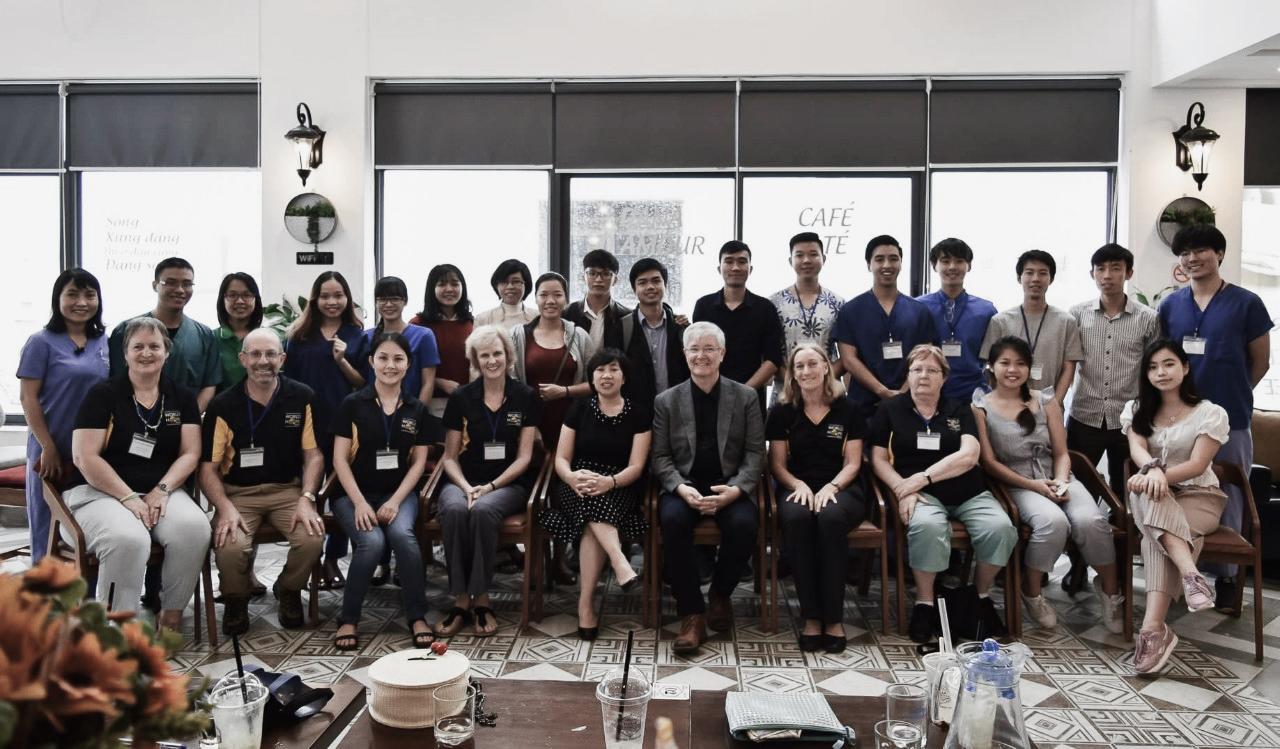
The Outreach Centre
Instead of the usual rotational service, EMW decided our team was needed at the rural Dong Phu Primary School in the Que Song District of the Quang Nam Province. EMW reported that more than 70% of students were from an impoverished household and over 80% had never received access to oral health services. These statistics were affirmed by the vast majority of students who had dental decay.
Each morning, the team would board a van at 7am from Da Nang and make the eighty minute journey to the school. We would not return to our hotels until as late as 7pm.
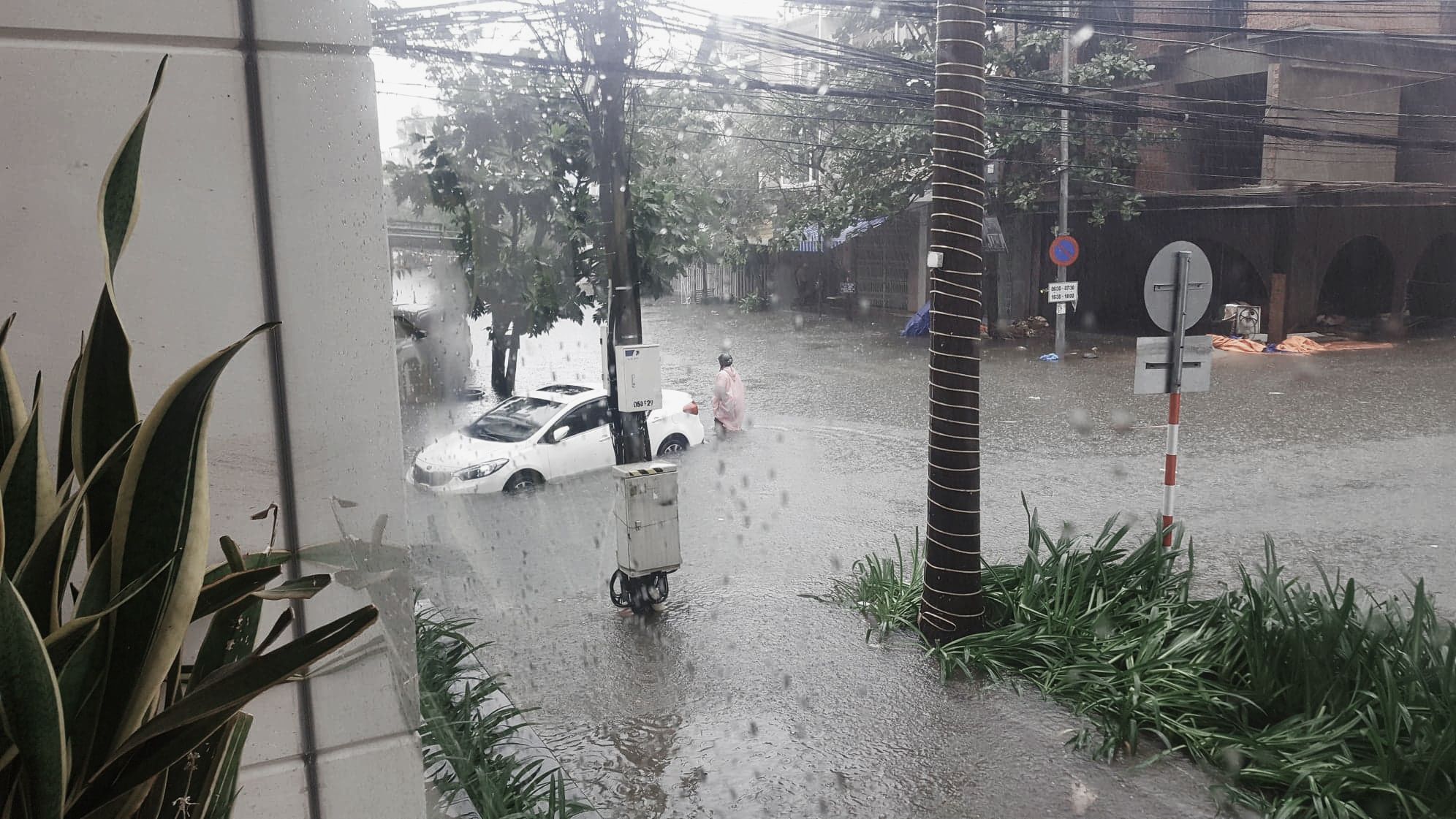 My turning point was when a great flood drowned the central regions of Vietnam including the streets surrounding our hotel. We managed to get transport from our hotel to the school, where on route we saw lakes that were rice paddy fields just the day before. Regardless of the likelihood that classes would be cancelled due to the flood, we made our way to the school with the hope that we could treat those students who could make their way to the school. The turnout was incredible and inspiring. We had a full day of treating the teachers and students motivated and dedicated enough to navigate flood waters for dental treatment. In Australia, I hesitate to even leave the house when it rains, however in rural Vietnam, the value of our dental treatment proved far greater than personal comfort or safety - I felt that such ardour should be met equally.
My turning point was when a great flood drowned the central regions of Vietnam including the streets surrounding our hotel. We managed to get transport from our hotel to the school, where on route we saw lakes that were rice paddy fields just the day before. Regardless of the likelihood that classes would be cancelled due to the flood, we made our way to the school with the hope that we could treat those students who could make their way to the school. The turnout was incredible and inspiring. We had a full day of treating the teachers and students motivated and dedicated enough to navigate flood waters for dental treatment. In Australia, I hesitate to even leave the house when it rains, however in rural Vietnam, the value of our dental treatment proved far greater than personal comfort or safety - I felt that such ardour should be met equally.
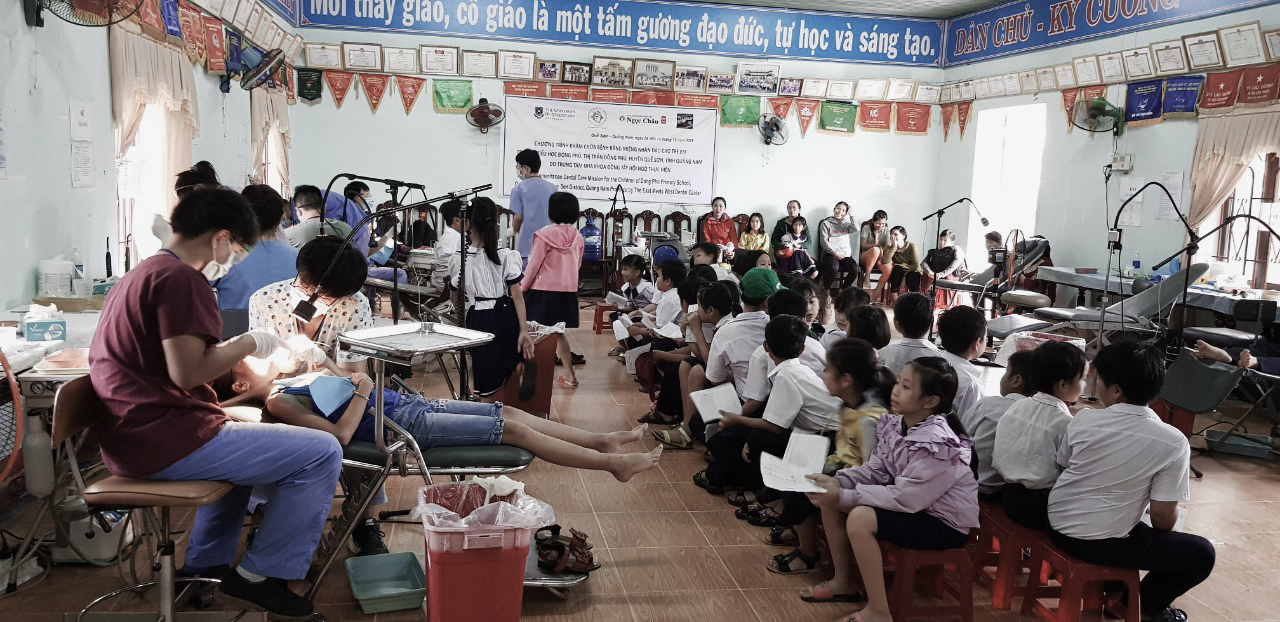 We transformed the school hall into a functional outreach centre with four stations for fissure sealants and restorations, two for extractions, one for debridement, one for fluoride application and one examination station. For the next two weeks our system was flexible, prioritising the station with the greatest queue. We did whatever we could to meet our daily quota of 100 patients per day. We would either assist each other, have one of EMW’s trained dental nurses with us or, if the need arose, guide the administrative staff on how to assist. The goal was to treat every staff member and student in the school within our two-week time frame. Unfortunately, time constraints meant sacrifices had to be made, where treatment was limited to only examinations, restorations, fissure sealants, extractions, fluoride application and the occasional debridement. Patients with further dental requirements had to be referred.
We transformed the school hall into a functional outreach centre with four stations for fissure sealants and restorations, two for extractions, one for debridement, one for fluoride application and one examination station. For the next two weeks our system was flexible, prioritising the station with the greatest queue. We did whatever we could to meet our daily quota of 100 patients per day. We would either assist each other, have one of EMW’s trained dental nurses with us or, if the need arose, guide the administrative staff on how to assist. The goal was to treat every staff member and student in the school within our two-week time frame. Unfortunately, time constraints meant sacrifices had to be made, where treatment was limited to only examinations, restorations, fissure sealants, extractions, fluoride application and the occasional debridement. Patients with further dental requirements had to be referred.
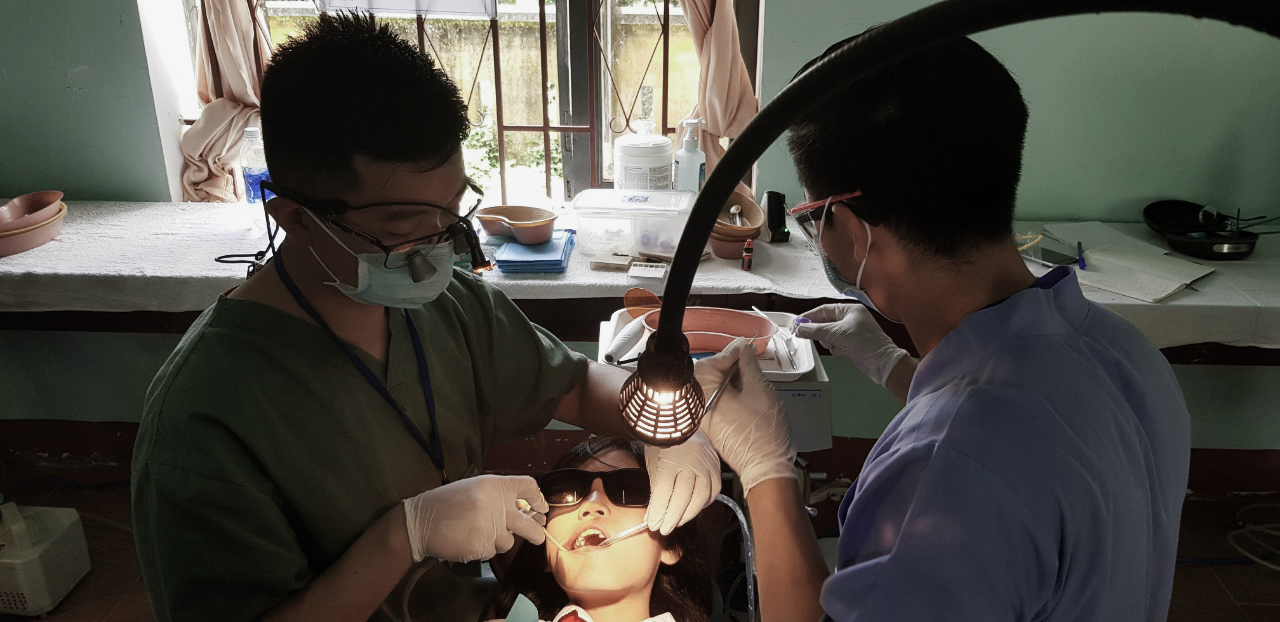
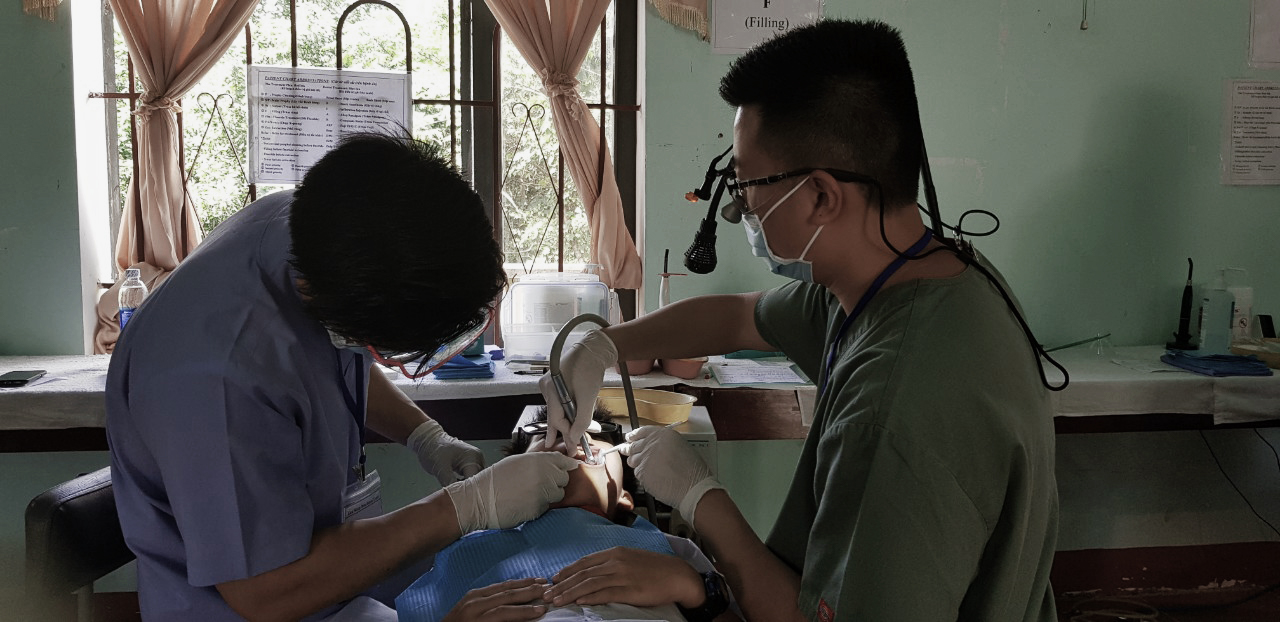
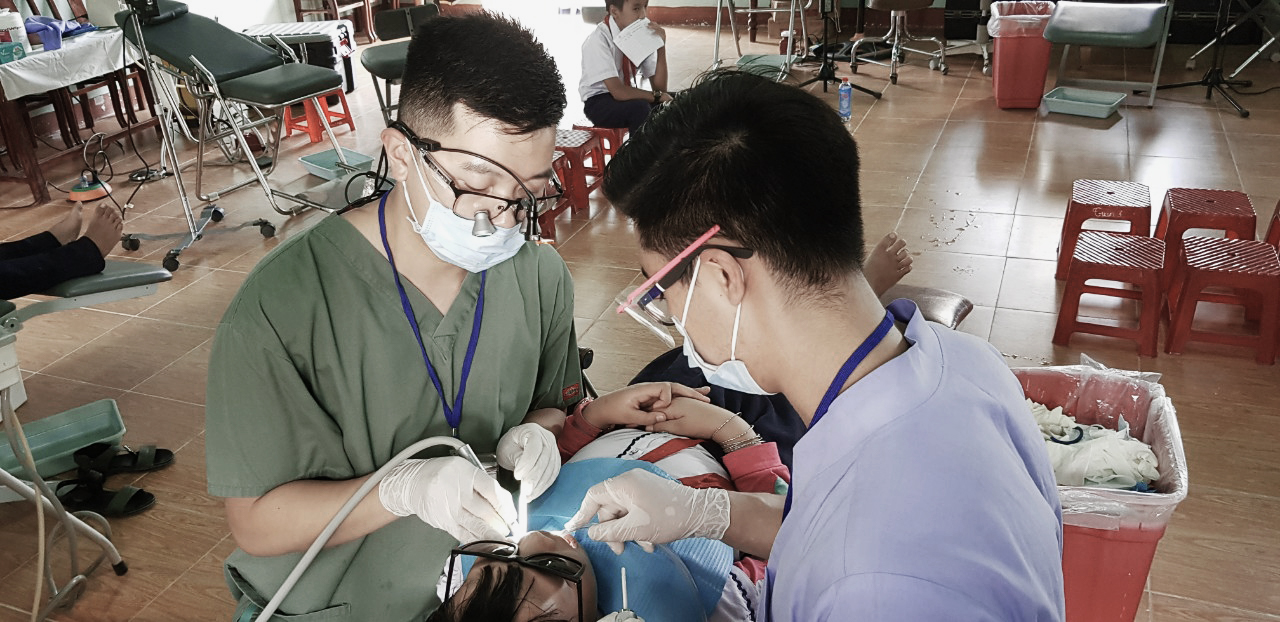 Challenges and lessons
Challenges and lessons
Each morning, we were greeted warmly by the students of the school. Little did we know that our patient management skills would be tested when those smiles turned into expressions of anxiety and tears. Most of the students had never experienced dental treatment and were terrified of needles. Coupled with the fact that these were paediatric patients under twelve years old, it was no wonder that they feared the loud alien equipment we were putting into their mouths. Nonetheless, we overcame the language barriers with clownish gestures and by butchering the Vietnamese language with our coarse accents. We developed our own management strategies and slowly the tears faded and were replaced by smiles by the time the children left our chairs. Inevitably, there were some who could not run away fast enough!
Available resources were limited. All chairs and dental units were portable and did not encourage the best ergonomics. The suction unit was on the slowest of speeds and most items were sent for sterilisation rather than being disposable. There were no sectional matrices nor clear mylar strips. There were limited flat plastics, ball burnishers, bur varieties, dappen dishes and just about every other piece of equipment! For students trained in a fully equipped university dental clinic, the first couple of days were a nightmare as my colleagues and I scrambled for what little equipment was available. However, we eventually learned to adapt. As perfectionists by occupation, we gave little compromise to quality of care and instead learned to work with less equipment and materials.
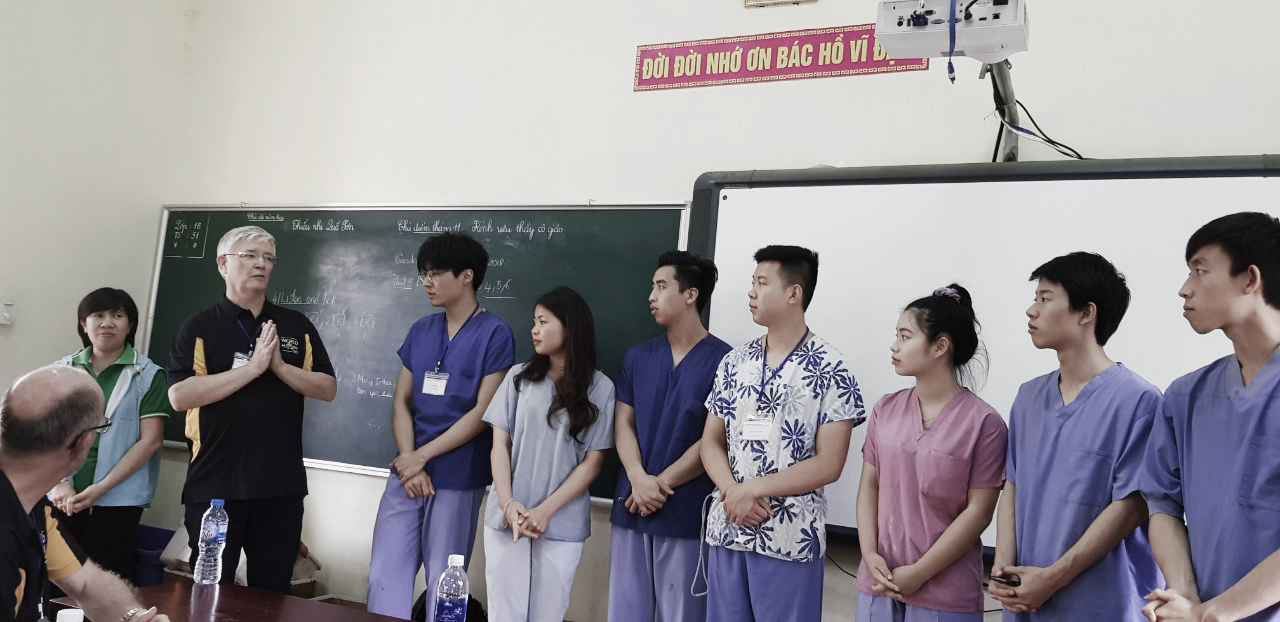
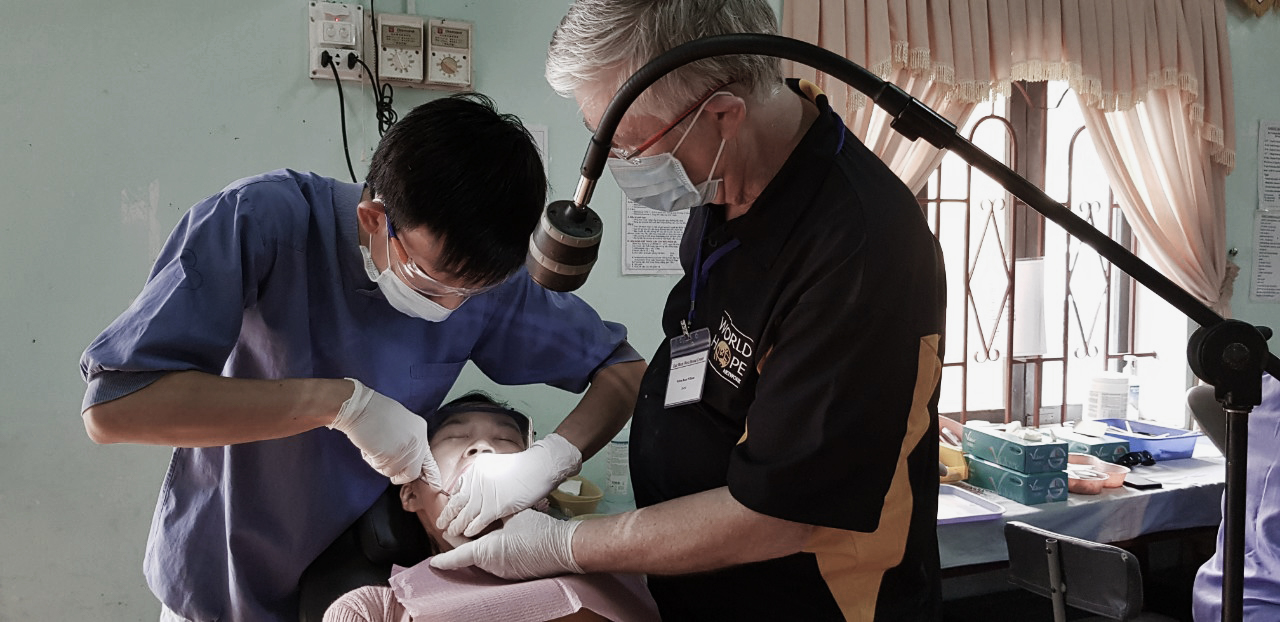 Having heard horror stories about infection control standards on other outreach programs, I was impressed by the high standards EMW upheld. Sometimes, we would advise EMW staff of techniques to improve their standards, such as wearing safety glasses while treating patients and repositioning ‘clean’ and ‘dirty’ zones. In return, they taught us Vietnamese phrases and creative methods of moisture control in a fidgeting child.
Having heard horror stories about infection control standards on other outreach programs, I was impressed by the high standards EMW upheld. Sometimes, we would advise EMW staff of techniques to improve their standards, such as wearing safety glasses while treating patients and repositioning ‘clean’ and ‘dirty’ zones. In return, they taught us Vietnamese phrases and creative methods of moisture control in a fidgeting child.
In our second week, we were joined by an international team of volunteer health professionals from the World Hope Network, including doctors, nurses and one dentist, Dr Bill Williams, known as ‘The Decathlon Dentist’, an expert in ten specialties of dentistry as well as author of the best seller ‘The $10,000 A Day Dentist: 50 Ways to Create a Highly Successful Practice’. We had the privilege of his mentorship, and also attended his lectures on the Ultratooth Single Day Implant System and how to build a successful, rewarding career. He would often observe each of us as we operated and offered personalised feedback.
Outcome
One of my early patients was a nine year old boy. He appeared serene as I greeted him to my chair. When I tried to examine his mouth with my mirror, he flinched but quickly regained his composure. I did not dwell much on his reaction. When I picked up the drill and gave it a test run, he burst out into fearful tears but he gave no audible cry. His desire for treatment had reduced him to quiet, disciplined whimpers. I put the drill down and chatted to him. My dental assistant helped translate where my broken Vietnamese failed. I learnt that it took him almost an hour to get to school by foot and that he had a younger sister and brother. I learnt that he had yet to think about his career, but definitely did not want to be a dentist. Finally, I learnt that he did not own a toothbrush or toothpaste. Even if he did, he was uncertain about how to use them. Having connected with him, we completed his treatment without further distress.
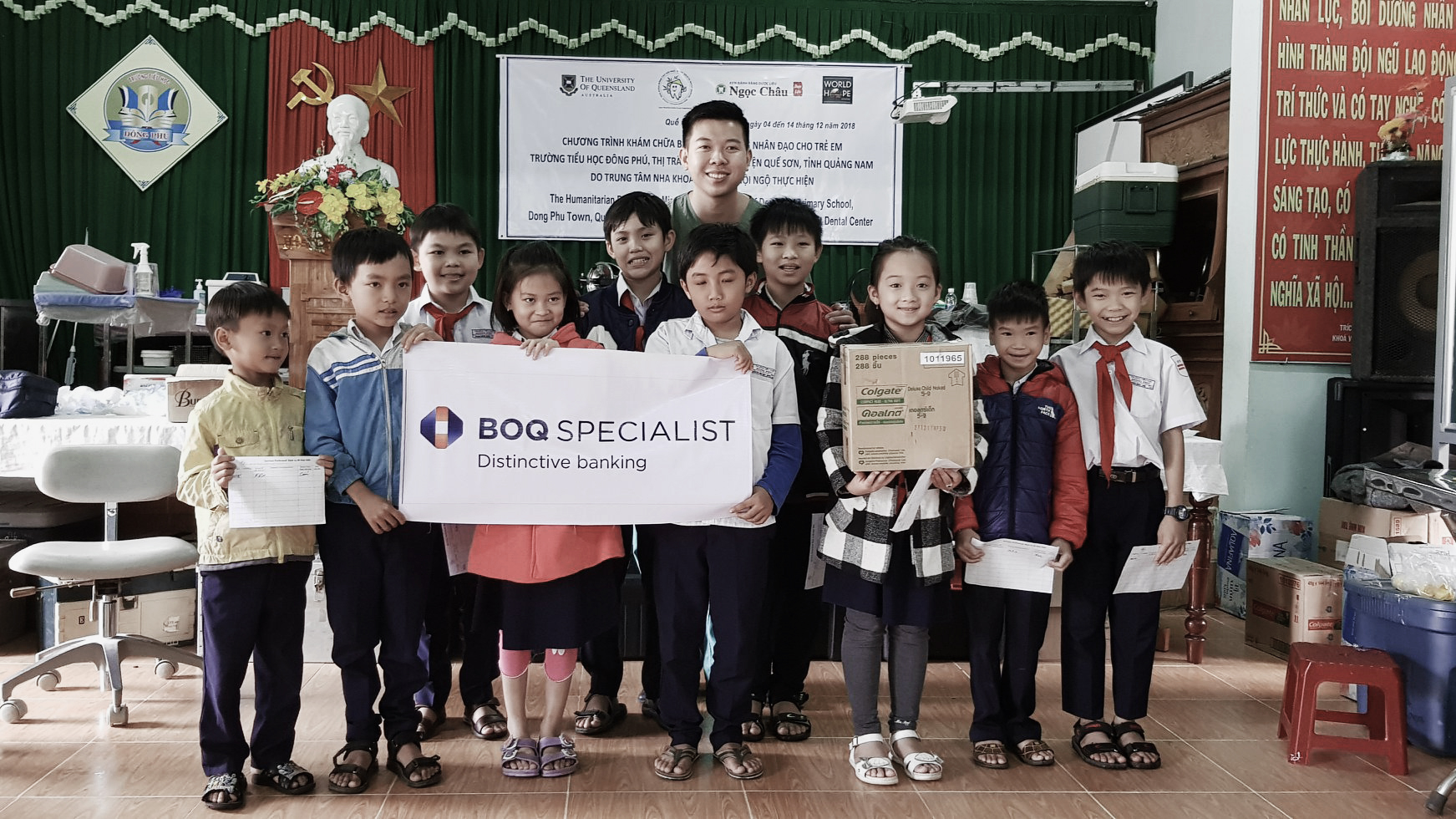 Although he left quite relieved, an idea was left behind. Over the next few days, I conferred with my other patients and learnt that his story was not uncommon. The majority could not prioritise basic oral hygiene even if they wanted to because they did not have access to a toothbrush or toothpaste. Consequently, I decided to allocate $500 of the BOQ Specialist FutureFocus Grant to purchase toothbrushes and toothpaste for the school. Accompanied with clear oral hygiene instructions, I hope that my grassroots approach to the public health issue will encourage preventative brushing and improve the oral health of the school.
Although he left quite relieved, an idea was left behind. Over the next few days, I conferred with my other patients and learnt that his story was not uncommon. The majority could not prioritise basic oral hygiene even if they wanted to because they did not have access to a toothbrush or toothpaste. Consequently, I decided to allocate $500 of the BOQ Specialist FutureFocus Grant to purchase toothbrushes and toothpaste for the school. Accompanied with clear oral hygiene instructions, I hope that my grassroots approach to the public health issue will encourage preventative brushing and improve the oral health of the school.
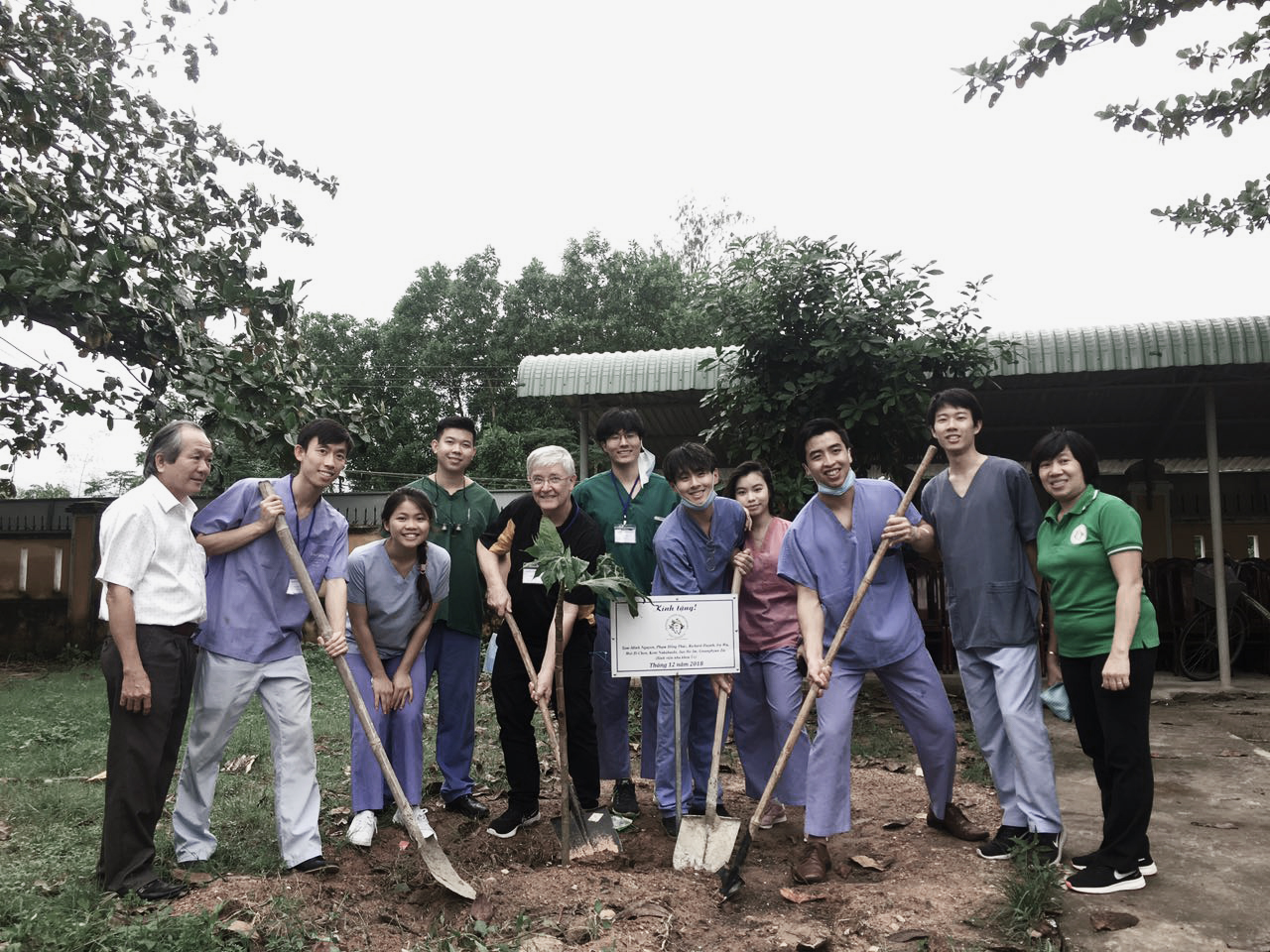
At the end of the relentless fortnight, we treated all 794 staff and student patients. There was a total of 2510 dental services rendered, including 467 restorations, 163 extractions, 990 preventative treatments such as fluoride varnishes and fissure sealants. The school’s appreciation for our success was overwhelming. They planted a tree on the school grounds to remember us and held a school-wide dance performance. The talented teachers had even cooked us a delicious lunch on our last day.
Overall, my trip could be described as an inspiring reaffirmation to dentistry. As a student I had become caught up in the routine of assessment tasks and meeting competencies. I had started losing touch with why I had wanted to practise dentistry in the first place. This overseas venture was a timely reminder of how dentistry could mean applying the sciences I enjoy toward helping people.
I have a renewed recognition that dentists are clinicians who care for and treat patients and should not be machines that churn out treatment codes. I am grateful to BOQ Specialist, who made this placement possible, because I now have a stronger appreciation for the privilege of access to oral healthcare that many of us take for granted in Australia, and a recognition that there are many population groups who are not as fortunate. This was my first outreach but it will certainly not be my last!
Following his placement, Richard now has a "stronger appreciation for the privilege of access to oral healthcare that many of us take for granted in Australia".
 Facebook
Facebook
Like and follow us on Facebook to keep up to date with all our student offers, events, competitions and more.
